Understanding Horoscopes: Insights into Astrological Wisdom
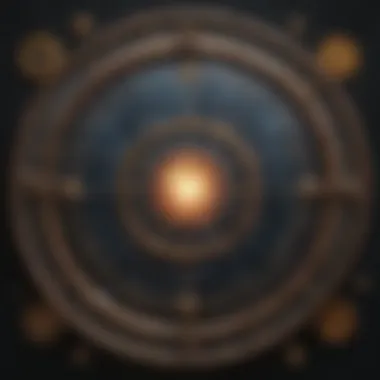

Intro
Horoscopes have long captured the imagination of many, serving as a bridge between the earthly and the cosmic. They often evoke a mix of skepticism and wonder, drawing people from various walks of life—including astrologers, esotericists, and casual readers. This article will explore the intricate tapestry that comprises horoscopes: from basic definitions to their historical roots, as well as their contemporary relevance in psychological wellness and personal growth.
By peeling back the layers of this celestial art, we will unravel common myths surrounding horoscopes and clarify their true essence. Whether you’re a seasoned astrologer looking to expand your knowledge or a curious newcomer, our goal is to illuminate the many facets of horoscopes, enriching your understanding of this ancient practice.
Astrological Concepts
Definition of Key Terms
Before diving into the intricate world of horoscopes, it’s paramount to define some key terms that will guide our exploration.
- Horoscope: A forecast based on the positions of celestial bodies at a specific time, usually at a person's birth.
- Zodiac: The band of the sky encompassing twelve signs, each associated with specific characteristics and personality traits.
- Natal Chart: Also known as a birth chart, it is a map that depicts the celestial positions at the time of an individual's birth.
Understanding these terms lays a solid foundation for delving deeper into the nuances of astrology.
Historical Background of Astrology
Astrology has deep roots flung far back into history, emerging as a practice in ancient civilizations like Babylon and Egypt. Centuries of observations have led to sophisticated systems that correlate celestial patterns with earthly events. At its core, astrology attempts to explain the world through the cosmic rhythms that guide destinies.
"History teaches us that astrology was not merely a pastime, but a respected science in its own right, intertwined with philosophy and the pursuit of knowledge."
From early star-gazers charting the heavens on clay tablets to the refined horoscopic systems used today, the quest to understand humanity's place within the universe has remained persistent.
Overview of Different Astrology Branches
Astrology isn't a one-size-fits-all system; it's diverse and multifaceted. Here are the key branches:
- Natal Astrology: Focuses on an individual's birth chart, offering insight into personality and potential life paths.
- Mundane Astrology: Deals with world events, forecasting trends and happenings based on celestial alignments.
- Electional Astrology: Guides individuals in choosing the most auspicious moments to begin new ventures or make significant decisions.
- Horary Astrology: Answers specific questions by analyzing the chart of the time the question is posed.
Each branch has its unique tools and methodologies, providing a wide range of insights depending on one's focus.
Zodiac Signs Exploration
In-Depth Analysis of Each Sign
The zodiac consists of twelve distinct signs, each with its character and traits.
- Aries (March 21 - April 19): Courageous, energetic, and passionate, often seen as trailblazers.
- Taurus (April 20 - May 20): Practical, reliable, and sensual, they appreciate the finer things in life.
- Gemini (May 21 - June 20): Adaptable, curious, and communicative, they thrive on variety and change.
This lists continues for each sign, breaking down their unique strengths and weaknesses, along with how these traits can manifest in life.
Personality Traits and Characteristics
Understanding the typical traits associated with each zodiac sign can offer valuable insights into behavior and interpersonal dynamics. For instance, Cancer individuals are often seen as nurturing and intuitive, while Leos tend to shine in leadership roles, radiating warmth and charisma.
It’s not merely about the sun sign; the entire birth chart offers a panoramic view of one’s personality.
Historical and Mythological Connections
Each zodiac sign also carries a rich tapestry of myths and stories that connect them to historical figures and events. These tales often inform the characteristics so commonly ascribed to each sign, adding depth to astrological interpretations.
Celestial Events
Major Cosmic Phenomena
Celestial events such as eclipses, retrogrades, and alignments can have significant energetic impacts. For example, solar eclipses often symbolize endings and new beginnings; they are times for introspection and transformation.
Impact of Celestial Events on Astrology
Astrologers closely monitor these events, as they can act as catalysts for change or reflection in the lives of those under their influence. The positions of planets during these events also play a crucial role in shaping their outcomes.
Rituals and Practices During Celestial Events
Many spiritual practices are associated with celestial events. For instance, during a full moon, individuals might participate in rituals aimed at releasing negativity and setting intentions. These practices serve to align personal energy with the cosmos, fostering a harmonious connection.
Defining Horoscope
Defining what a horoscope is forms a foundational stone in understanding the broader topic of astrology. A horoscope is not merely a collection of celestial events and astrological jargon; it serves as a personalized map of the cosmos at a specific moment, often at the time of an individual’s birth. This celestial chart gives insights into one's character, life challenges, and potential paths forward. Thus, understanding a horoscope can offer profound benefits for self-awareness and personal growth.
Origins of the Term
The word "horoscope" finds its roots in the Greek words horoskopos, meaning "time watcher." In ancient times, this term was used to denote a chart that captured the exact position of celestial bodies at a given time. Known as a key to understanding the interplay of cosmic influences, the term itself embodies the intricate connection between time and space, which is essential in astrology. This relationship between the movement of celestial bodies and earthly occurrences reveals an enchanting tapestry woven by fate, which many believe can aid in clarifying life's mysteries.
Basic Components of a Horoscope
A comprehensive understanding of horoscopes involves delving deep into their essential components. Here, we'll break down three significant elements crucial to horoscopes - Zodiac signs, the House system, and the planets and their positions.
Zodiac Signs
Zodiac signs are perhaps the most recognized aspect of astrology for many. Represented by twelve distinct signs, each sign corresponds to specific dates and embodies unique traits, strengths, and weaknesses. For instance, an Aries, born between March 21 and April 19, is often characterized by assertiveness and passion, while a Pisces, from February 19 to March 20, may be perceived as artistic and intuitive.
The beauty of the zodiac lies in its exclusivity; while you may share your sun sign with millions, your astrology chart is deeply personal. This individualized aspect makes zodiac signs a valuable tool in horoscopes, guiding people toward self-discovery and a deeper awareness of their inherent gifts and challenges.
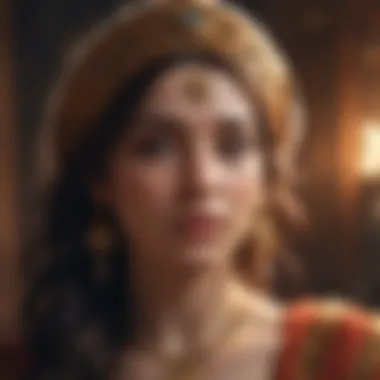

House System
The House system adds another layer to the interpretation of horoscopes. In essence, it divides the celestial sphere into twelve segments, each representing different life areas. For example, the first house relates to self-identity, while the seventh house covers partnerships and relationships. Understanding where these houses sit in one’s astrological chart showcases a person’s priorities and challenges across various life sectors.
One unique feature of the House system is its ability to connect the cosmic and the personal—helping individuals gain insights into specific realms of life they need to focus on or explore further. This characteristic enhances the overall interpretation of horoscopes, making it a vital aspect for those seeking deeper clarity in their life journeys.
Planets and Their Positions
The placement of planets relative to zodiac signs and houses is a pivotal aspect of horoscopes. Each planet symbolizes different energies and influences—as the Moon relates to emotions, and Mars pertains to aggression and motivation. The unique positions of these planets at one’s birth not only shape their personality traits but also indicate key life events.
For instance, if Venus resides in the fifth house at the time of birth, this may signify a strong inclination toward love affairs and creativity, whereas Saturn in the second house could suggest challenges regarding finances and self-worth. Hence, the significance of planetary positions cannot be overstated. They provide nuanced insights drawing meaningful connections between celestial activities and life experiences.
"Horoscopes act like guideposts, helping individuals navigate the winding roads of life through cosmic understanding."
In summation, to define a horoscope is to encapsulate a complex interplay of celestial factors—zodiac signs, house systems, and planetary positions—which serve both as a tool for self-reflection and insight into personal development. By examining these elements, individuals can unlock a deeper understanding of themselves against the backdrop of the universe.
History of Horoscopes
The history of horoscopes serves as a vital backdrop for understanding their evolution and integration into contemporary spiritual practices. This section examines the journey of astrology through various cultures and epochs, providing insights into how these celestial maps were crafted, interpreted, and revered. By tracing the influence of ancient civilizations and the transformations that occurred throughout history, readers can appreciate not merely the significance of horoscopes in personal guidance but also their cultural blossoming over millennia.
Ancient Civilizations and Astrology
Sumerians and Early Astronomy
The Sumerians, often hailed as pioneers in astrology, laid the groundwork for celestial observations around 4000 BCE. Their fascination with the night sky led to systematic recording of astronomical events. It is the early observations of the movement of the stars and planets that showcased a key characteristic of Sumerian astronomy: the use of the lunar calendar. This calendar was vital for agricultural planning and ritual events, highlighting the practical nature of their astrological practices.
The primary contribution of Sumerians was their introduction of a systematic approach to tracking celestial bodies. Unlike any before them, they began correlating planetary movements with terrestrial events, establishing a cosmic connection that illustrates why their practices were particularly beneficial in the context of ancient life.
Interestingly, while Sumerians gained significant advantage from these observations, their methods lacked the depth of character analysis seen in later astrology. Still, the foundation they created allowed subsequent cultures to build upon their astronomical knowledge.
Egyptian Contributions to Astrology
The Egyptians made substantial strides in astrology by integrating it with their elaborate mythology and religious practices. Their deep reverence for celestial phenomena is marked by the construction of significant monuments, like the pyramids, aligned with stellar positions. This keenness to link astrology with spirituality reflects a distinctive characteristic of Egyptian contributions.
The Egyptians developed complex systems that assigned celestial bodies to their deities, presenting a unique feature that blended astronomy with practical divination. This duality offered both a scientific perspective and a moral compass to guide individuals, making it a chosen method for personal insight.
However, while these systems provided fruitful avenues for spiritual and personal exploration, they often demanded significant scholarly effort to interpret. This complexity can be seen as both an advantage, as it allows for rich interpretative depth, and a disadvantage, distancing casual practitioners from the insights that astrology could provide.
Greece: The Birthplace of Western Astrology
Hellenistic Greece crystallized the foundations of what many refer to as Western astrology. Here, scholars like Ptolemy advanced astrological frameworks that echoed through the centuries. The most renowned characteristic of this period was the synthesis of empirical observation and philosophical elements, forming a cohesive astrological thought.
Greece's contributions to astrology stand as a beacon for clarity and systematic interpretation. Greek astrologers codified zodiac signs, sophisticated aspects, and house systems, positioning themselves as a hugely beneficial influence on the evolution of horoscopes.
A unique feature of Greek astrology is its emphasis on personality traits corresponding to specific zodiac signs. This nuance offers a practical tool for personal exploration and growth, yet it also introduces a subjective element that can sometimes lead to misinterpretation. Modern practitioners still turn to these ancient principles, grappling with the advantages they offer both in accuracy and deeper understanding.
Evolution Through the Ages
Medieval Interpretations
During the medieval period, astrology faced a complex interplay of philosophy and theology. Scholars enriched the existing traditions while struggling against skepticism arising from religious orthodoxy. A key characteristic of medieval astrology was its focus on prophecy, where practitioners emphasized predictive aspects over individual psychological insights. This focus gained recognition among those wanting to foresee events, establishing astrology as both a sacred art and a practical tool for guidance.
The rich compilations in texts such as Picatrix indicate how astrological knowledge was preserved and expanded. There are advantages here regarding the diversity of interpretation, but the focus on prophecy sometimes led away from personal introspection.
Renaissance Developments
The Renaissance period sparked a revival of classical knowledge, signaling a pivotal moment for astrology. Scholars like Johannes Kepler and Nostradamus pushed the boundaries as they strove to align astrological practice with burgeoning scientific thought. The hallmark of this era was the reintegration of astrology into the academic and scientific discourse, allowing for a richer framework of analysis.
Renaissance developments offered the opportunity to blend tradition with newfound scientific rigor, making them especially beneficial for the understanding of horoscopes. Yet, there was an accompanying pressure to validate astrology with precise observation, which sometimes diminished its intuitive aspects.
Modern Adaptations
The 20th century witnessed a democratization of astrology, with horoscopes becoming widely accessible through newspapers and magazines. This period highlighted the shift from deeply scholarly practices to more personalized, casual interpretations, resonating with a broader audience. A defining feature of this modern approach is the use of technology and social media, enabling instantaneous access to astrological insights.
The adaptability of astrology to contemporary contexts demonstrates its robust nature. However, this transformation also introduces challenges in maintaining depth and accuracy, often favoring entertainment over genuine insight. While many appreciate horoscopes for personal guidance, it's essential to sift through the noise and seek out thoughtful interpretations for true benefits.
"Astrology is not a science, but it offers a language and framework for understanding one’s place in the universe."
In summary, the journey through the history of horoscopes reveals a tapestry woven from various cultures and epochs, each contributing distinct threads. As we learn from these past interpretations and practices, a more enriched understanding of their role in our lives today can emerge.
Components of a Horoscope
Understanding horoscopes goes beyond surface-level curiosity; it involves dissecting various components that make up this celestial art. Each part, whether it's the zodiac signs, the houses, or the planets, serves a distinct purpose in the broader context of astrology. Each element can shape an individual’s personality, predict events, or guide one's life choices. Knowing these components enhances the depth of insight one can glean from a horoscope, making the journey of discovering one’s astrological profile more profound.
Zodiac Signs Explained
Zodiac signs often come to mind first in discussions about horoscopes. They serve as the foundation of astrological interpretation, categorizing personalities into twelve distinct labels. The signs are tied to the constellations that the sun appeared to travel through during one’s birth month, but they represent much more.
Fire, Earth, Air, Water Elements
The elements—fire, earth, air, and water—form the backbone of zodiac signs. Each element embodies a specific characteristic that shapes how individuals relate to the world. Fire signs—Aries, Leo, and Sagittarius—are often seen as vibrant and confident, naturally leading others. Earth signs—Taurus, Virgo, and Capricorn—tend to be practical and grounded, focusing on stability and security. Air signs—Gemini, Libra, and Aquarius—are known for their intellect and sociability, often thriving in communication. Lastly, Water signs—Cancer, Scorpio, and Pisces—carry an emotional depth that allows them to deeply connect with others.
This elemental classification adds a unique feature to horoscopes, giving astrologers a tool to understand how an individual might respond to various situations. However, connecting with just one element can be problematic; it limits the full spectrum of human experience. Each element is equally crucial, leading to a well-rounded personality. Thus, understanding these elements assists readers in appreciating the complex interactions within a horoscope.
Modalities: Cardinal, Fixed, Mutable
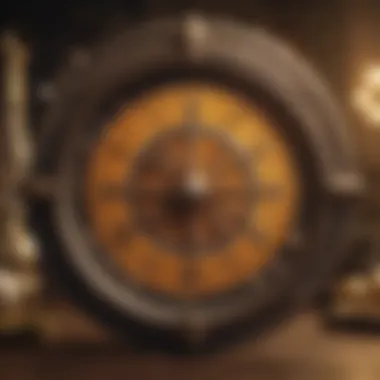

Modalities further complicate the zodiac, grouping signs into three categories: cardinal, fixed, and mutable. Cardinal signs—Aries, Cancer, Libra, and Capricorn—are initiators and natural born leaders. They thrive on action and often take charge of situations. Fixed signs—Taurus, Leo, Scorpio, and Aquarius—are characterized by their steadfast nature, resistant to change. Lastly, Mutable signs—Gemini, Virgo, Sagittarius, and Pisces—are highly adaptable, making them versatile in various situations.
This classification illustrates different approaches individuals might take in life. Knowing one’s modality can guide personal development, highlighting strengths and possible areas for growth. However, focusing too heavily on a single modality might constrain the understanding of one’s overall character and experiences. Striking a balance with all modality types offers a richer understanding of life dynamics.
The Role of Houses in Horoscopes
The houses in astrology further nuance our understanding of horoscopes. These 12 sections of the natal chart represent different areas of life, like relationships, career, and inner self. Each house's placement reveals how the planets and signs influence specific aspects of one’s experience.
Understanding Astrological Houses
Each house has a guiding principle that determines its domain. For instance, the first house relates to self-image and identity, while the seventh house revolves around partnerships and marriage. By analyzing the houses, one can ascertain where energy should be focused or where challenges might arise.
Astrological houses act as a lens through which horoscopes can be interpreted in detailed ways. They allow for a more intricate understanding of life events. However, too much focus on the houses may lead to overlooking the interplay of the entire chart, so a holistic view remains critical.
Significance of the Ascendant and Midheaven
The ascendant, or rising sign, is often regarded as one of the most essential features of a horoscope. It represents how you present yourself and how the world perceives you. The Midheaven, on the other hand, relates to public life and career aspirations. These two points act as birational anchors, providing context to the overall reading.
In astrological practice, these points help delineate personal goals and interactions. They offer insight into not just who you are, but how you shine in society. Yet, an over-reliance on these aspects can shift focus away from the internal characteristics that drive behavior; hence, a balanced viewpoint is beneficial.
Planetary Influences
The planets in astrology symbolize various energies that interplay with the signs and houses in significant ways. They can denote personal attributes, societal influences, and even collective experiences. Understanding these influences makes for richer, more accurate readings.
Personal Planets
Personal planets—Mercury, Venus, and Mars—play a direct role in shaping an individual’s personality. For instance, Mercury affects communication styles, while Venus influences relationships and aesthetics. These planets move quickly through the zodiac, which means their effects are often felt keenly.
This close connection to personal experiences makes personal planets particularly engaging. They are foundational in ascertaining how someone navigates day-to-day life. However, concentrating solely on personal planets may overlook the larger influences at play.
Social and Transpersonal Planets
Beyond the personal, social planets like Jupiter and Saturn represent broader themes. Jupiter, often related to growth and expansion, contrasts with Saturn’s more reserved, disciplined approach. Together, they provide a comprehensive look at social dynamics and intentions within a horoscope.
These social planets enhance the narrative of a horoscope, connecting personal traits with societal influences. Their broader themes can sometimes detract from individual interpretations, but they are essential for understanding how a person fits into the larger picture.
Influence of Nodes and Asteroids
The lunar nodes and asteroids introduce additional complexity. The North and South Nodes often symbolize life lessons and karmic paths, while asteroids like Chiron can reveal hidden wounds and healing journeys. These elements enrich the astrological narrative, making it deep and multifaceted.
Understanding nodes and asteroids adds a layer of depth to one’s horoscope, as it emphasizes personal growth and transformation. However, over-analyzing these elements might lead to confusion or misinterpretation. A balanced approach ensures these nuances enhance rather than complicate the overall interpretation.
Horoscopes in Practice
The realm of horoscopes extends beyond mere entertainment; it delves deep into the intricacies of our daily lives, providing insights that can shape our decisions and understanding of ourselves. A practical approach to horoscopes is essential for those interested in applying astrological principles in a meaningful way. This section examines the ways horoscopes are utilized, focusing on their creation, personalized interpretations, and compatibility analysis, each of which holds unique significance.
Daily, Weekly, and Monthly Horoscopes
How They Are Created
Daily, weekly, and monthly horoscopes are crafted based on the positions of celestial bodies. Astrologers observe the movements of planets and their angles relative to the Earth to formulate these predictions. The gist here is that the alignment of these celestial bodies can influence human affairs, an idea that dates back centuries.
A key characteristic in their creation is the ephemeris, a celestial chart that tracks planetary movements. Using this chart, astrologers identify significant events and alignments to predict outcomes for individuals based on their zodiac signs. This method of forecasting serves many as a beneficial tool in navigating life’s unpredictabilities, simplifying complex astrological data into understandable predictions.
However, there are unique features regarding how these horoscopes are created. Often, astrologers utilize personal data—like the time of birth—to create more tailored forecasts. This adds depth but also invites complexity to the process. A notable disadvantage is that sample interpretations may vary widely between astrologers, leading to conflicting predictions that can confuse rather than clarify.
Interpretation Techniques
Interpretation techniques play a pivotal role in how horoscopes are utilized. They encompass a variety of methods, from general advice based on zodiac signs to intricate analyses contingent on personal birth charts. Astrologers often prioritize specific astrological aspects, such as transits and progressions, to derive insights.
A key characteristic of interpretation techniques is their flexibility. Some astrologers adopt a psychological approach, melding astrology with insights into behavior and motivation. This choice resonates with individuals seeking deeper understanding beyond surface forecasts. The unique benefit of these techniques is their capacity to provide a personalized experience, allowing people to discern their challenges or opportunities for growth.
On the flip side, the complexity of interpretations can prove overwhelming for beginners, who may find it difficult to sift through layers of astrological jargon. Misinterpretations can easily occur if one does not fully grasp the subtleties involved.
Personalized Horoscopes
Using Birth Charts for Insights
Personalized horoscopes hinge on the unique aspects of an individual's birth chart. This chart serves as a cosmic fingerprint, revealing the positions of planets at the moment of one’s birth. Each component—the sun, moon, and rising signs—offers a glimpse into personality and potentials.
The key characteristic of using birth charts for insights lies in their specificity. Unlike generalized horoscopes found in newspapers, personalized charts provide detailed prospects about challenges, ambitions, and relationships. This aspect makes them a beneficial choice for serious astrology enthusiasts seeking profound self-awareness. The real advantage comes from the ability to drill down into one's emotional landscape, allowing for insightful dialogues about life choices.
However, creating and understanding a birth chart can feel like a different animal for some. It requires a certain level of astrological knowledge that may seem daunting. Inaccessibility for those new to astrology or lacking interest in the computational side can limit engagement and understanding.
Astrology Software and Tools
Astrology software and tools enhance the experience of crafting and interpreting personalized horoscopes. These programs automate calculations, generate birth charts, and sometimes even analyze current transits, making it easier for users.
The key characteristic here is automation, which enables quicker interpretations than manual calculations. This beneficial aspect allows for broader access to astrological insights, giving users, regardless of skill level, the chance to delve deeper into their cosmic positions. Some software also includes community features, fostering a sense of engagement among users.
Yet, a downside exists in the reliance on software. Overdependence can lead to a loss of clarity regarding interpretations, as one may miss the nuances that a seasoned astrologer could pinpoint. It can also promote surface-level understanding, neglecting the depth that some individuals seek in their astrological journey.
Compatibility Analysis
Synastry and Composite Charts
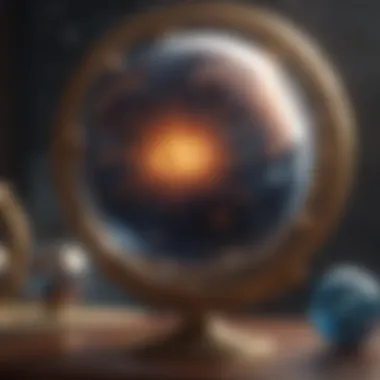
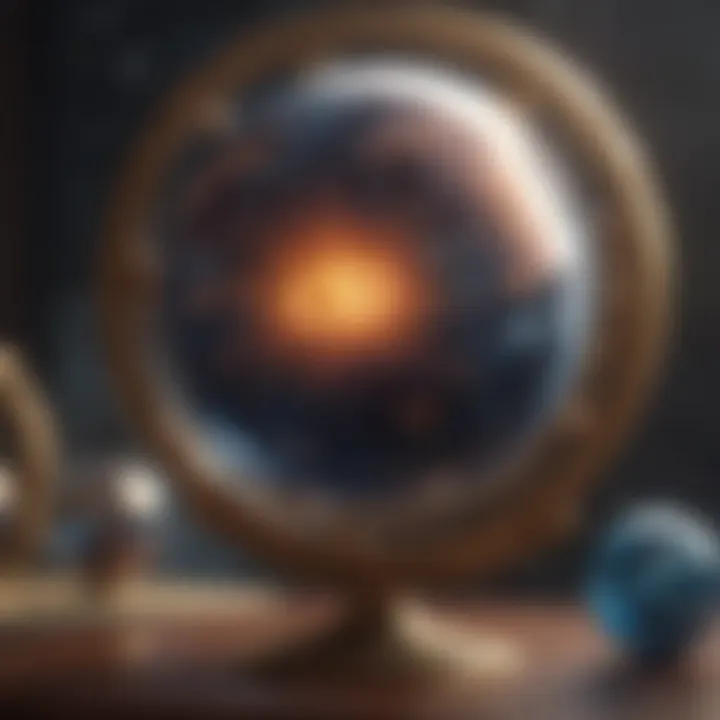
Compatibility analysis in astrology typically involves synastry and composite charts, each offering different insights into relational dynamics. Synastry looks at the interaction between two individuals' birth charts, shedding light on areas of harmony and tension. Conversely, composite charts create a new chart that represents the relationship as a whole.
A key characteristic of synastry is its focus on individual interactions. This becomes a popular choice for those wanting to understand their relationships more deeply. The unique feature lies in how it highlights potential challenges or strengths, allowing individuals to foster better communication. However, synastry’s complexity can lead one into a rabbit hole of over-analysis, potentially leading to misinterpretations.
Interpreting Compatibility Reports
Interpreting compatibility reports is often an eye-opener for those looking to understand personal relationships better. These reports aggregate insights from both synastry and composite analyses, presenting a more holistic view of the partnership. Key characteristics include clarity and information density, both great for providing quick insights into compatibility.
By noting aspects such as shared values and differing approaches, individuals can navigate their relationships with greater awareness. This beneficial choice can encourage intentional discussions about goals and challenges. On the downside, overly relying on a report may cloud one's judgment concerning emotional realities—sometimes intuition holds the key beyond what the stars offer.
"Astrology provides insights, yet it's essential to blend those insights with personal experiences and feelings."
Contemporary Perspectives on Horoscopes
The examination of horoscopes has transcended the boundaries of mere curiosity in recent years. In the contemporary landscape, horoscopes resonate with many people, ranging from daily subscriptions in glossy magazines to intricate birth charts discussed in online forums. This section highlights the increasingly prominent role horoscopes play in daily life and the psychological, cultural, and technological dynamics that shape their perception in today's society.
Horoscopes in Popular Culture
Media Representation of Astrology
Media representation of astrology has evolved to encompass a myriad of formats, from traditional newspaper columns to digital platforms. This widespread portrayal shapes public interest and involvement in astrology. One key characteristic of this media representation is its ability to turn astrological content into bite-sized, digestible pieces. Weekly forecasts showcasing individual sun signs have a unique feature: they tend to mainstream complex astrological concepts into understandable language. Yet, while this demystifies astrology for many, it can also lead to significant oversimplifications, leaving some key details by the wayside.
The accessibility that media representation provides contributes positively to this article's goal of increasing awareness about horoscopes as a modern spiritual practice. However, the danger arises in the reduction of astrology into mere entertainment without considering its deeper implications and meanings. Not all representations uphold the sacred complexity of astrology, as some prioritize sensationalism over authenticity.
Online Platforms and Community Engagement
With the rise of social media and specialized forums like Reddit or Facebook groups, online platforms have become hotspots for astrology enthusiasts. Here, individuals connect over shared interests in horoscopes, exchanging personal stories and insights. The engagement in discussions surrounding astrology facilitates a greater understanding of this practice, enriching the community.
A significant draw of online platforms is the sense of belonging they offer. Participants can share their birth charts, seek advice, or simply collaborate in explorative discussions about planetary alignments. The unique feature of these platforms lies in their interactive nature, where individual experiences are shared and expanded upon, generating a richness in interpretation.
However, this community engagement is not without its pitfalls. The spread of misinformation can be rampant, with unverified astrological claims often proliferating through such channels, leading to confusion among novices.
Psychological Impacts of Reading Horoscopes
Personal Development and Self-Reflection
Reading horoscopes can provoke personal development and encourage self-reflection. Many individuals find themselves engaged in a deeper inquiry about their emotions, traits, or life paths based on horoscope insights. The primary characteristic of this practice is its ability to inspire introspection. For individuals seeking clarity amid life's chaos, horoscopes can act as gentle reminders or prompts toward self-assessment.
Despite being viewed as a light-hearted endeavor, many practitioners report that horoscopes help them navigate personal challenges. This engagement can become a beneficial tool, guiding individuals in considering their choices and behaviors. The potential downside, however, is the risk of over-reliance on external guidance, where individuals might substitute personal judgment with astrological advice.
Horoscopes and Spiritual Wellness
The connection between horoscopes and spiritual wellness is increasingly acknowledged, with many practitioners using them as a means of exploring their spiritual journeys. Horoscopes may serve as a catalyst for exploring metaphysical concepts and understanding deeper connections between oneself and the universe. The fundamental characteristic of this relationship is the quest for holistic well-being, as individuals integrate astrological interpretations into their lives for improved spiritual balance.
Horoscopes can promote peace of mind and a sense of belonging to something greater. Nonetheless, one unique feature to consider is that not everyone interprets astrological messages as positive. For some, dealing with challenging placements or interpretations may lead to destabilization rather than spiritual upliftment.
"Horoscopes, far from being frivolous, provide a reflective framework through which people can understand their place in the cosmos and make sense of their daily experiences."
Epilogue
Pondering the contemporary perspectives on horoscopes unfolds important insights into their relevance. As they weave through popular culture while impacting psychological wellness, it becomes clear that horoscopes play a significant role in both individual and collective experiences in today’s world. Understanding these perspectives allows for a more holistic comprehension of why horoscopes continue to capture the imagination of many.
The Future of Horoscopes
The realm of horoscopes is constantly evolving, entwined with the currents of social dynamics, technological change, and personal aspirations. As society shifts toward a more interconnected, virtual existence, the ways we engage with astrology are likely to see a remarkable transformation. This section explores key aspects that could shape the future of horoscopes, emphasizing the integration of technology, community, and modern interpretations of traditional practices. Understanding these developments is crucial for both practitioners and enthusiasts, as it opens doors to new insights into personal and collective journeys.
Technological Advances and Astrology
Apps and AI in Horoscope Generation
The rise of mobile applications and artificial intelligence presents an intriguing avenue for horoscope generation. Today, apps like Co–Star and Astropad allow users to receive personalized astrological forecasts right in their pockets. The hallmark of these technologies lies in their algorithms that analyze extensive datasets, creating horoscopes tailored to individual birth charts.
The most significant advantage here is accessibility—people can easily tap into astrological insights without consulting an astrologer in person. Furthermore, these apps often feature user-friendly interfaces that appeal to a diversity of users, whether they're astrology aficionados or casual dabblers.
Yet, there are clouds in this silver lining. While they might offer brevity and convenience, such apps can risk oversimplifying nuanced interpretations of horoscopes. The subtle intricacies that an experienced astrologer captures might be lost when filtered through automated systems. Still, their popularity suggests a trend towards democratization in astrology, enabling more people to engage with this ancient practice.
Virtual Communities and Knowledge Sharing
The rise of social media platforms and online forums has birthed countless virtual communities focused on astrology. Places like Reddit and Facebook brim with discussions about celestial phenomena, personal experiences, and astrological insights. These online spaces harness the power of collective knowledge, where diverse perspectives collide to provide a richer understanding of horoscopes.
The key characteristic of these communities is the immediacy of interaction. Unlike traditional gatherings or workshops, online platforms enable members to share insights and receive feedback in real time. This immediacy can enhance learning, as individuals can quickly test their interpretations against the collective wisdom of the group.
However, navigating such an expansive online landscape can be tricky. Individuals may encounter differing opinions or even misinformation. It is crucial to discern which sources hold authenticity and accuracy. As digital discussions thrive, maintaining a level of critical thinking becomes essential for anyone delving into astrological insights on these platforms, ensuring the reliability of shared knowledge.
Astrology's Role in a Changing World
Adapting Traditional Astrology to Modern Life
As minds open to astrology, there's a pressing need for adapting traditional principles to align with contemporary lifestyles. Many practitioners are now creatively weaving ancient wisdom with modern ideologies, addressing topics like mental health or personal empowerment through the lens of astrology. This not only makes horoscopes more relatable but also serves to reinforce astrology's relevance in today's society.
The appealing aspect of these adaptations is that they resonate with personal experiences. By addressing modern challenges, such as career anxieties or relationship dynamics, new interpretations of horoscopes may provide actionable insights for personal development. Additionally, blending traditional astrological frameworks with current societal understanding can enhance the appreciation of horoscopes as tools for self-growth.
However, there’s the distinct risk of diluting core astrological concepts in the process of modernization. Striking the right balance between tradition and adaptation is key to sustainable growth in astrology.
Trends in Astrological Inquiry
Examining emerging trends in astrological inquiry can offer a glimpse into the future of horoscopes. There is a noticeable shift towards exploratory aspects of astrology, where individuals engage in not just personal horoscopes but also take interest in broader themes like world events, societal shifts, or even climate change from astrological perspectives. This indicates that horoscopes are not merely personal forecasts but are increasingly viewed as instruments to analyze collective human experiences.
The significant part here is incorporating psychology and sociology into astrological inquiry. By doing so, practitioners can expand the conversation around horoscopes, allowing them to serve as platforms for broader dialogues. This approach nurtures a richer context, making horoscopes a medium for understanding and navigating complexities of modern life.
In summary, the future of horoscopes lies at the intersection of technology, community, tradition, and modern inquiry. As these elements merge, horoscopes could play a pivotal role in addressing both individual and collective needs in an ever-changing world. The journey ahead will undoubtedly present fascinating opportunities for both experienced astrologers and curious newcomers alike.







